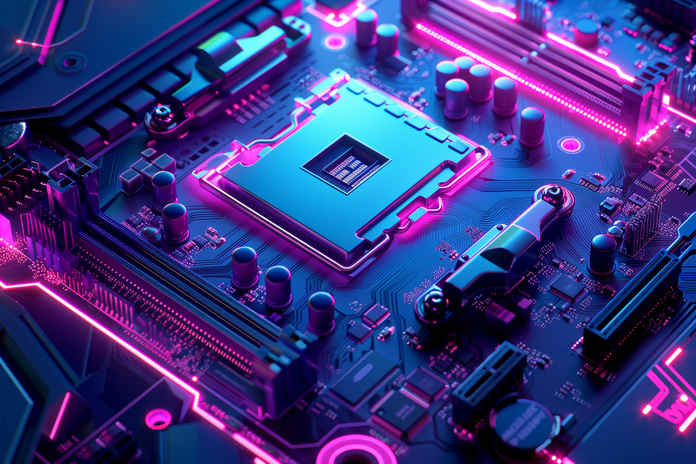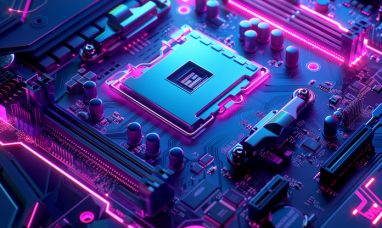Intel (NASDAQ:INTC) is taking a bold step in the artificial intelligence (AI) space with the launch of two new AI chips: the Xeon 6 CPU and Gaudi 3 AI accelerator. These chips are designed to enhance Intel’s presence in the data center market, positioning the company as a significant player in the growing AI sector. This launch comes amid rumors of a possible takeover by Qualcomm (NASDAQ:QCOM), further intensifying speculation about Intel’s future.
Intel’s New AI Chips: Xeon 6 and Gaudi 3
Intel’s latest AI chip offerings, the Xeon 6 and Gaudi 3, are designed to improve performance and efficiency in AI applications. The Intel AI chips aim to compete directly with AI chip powerhouses like Nvidia (NASDAQ:NVDA) and AMD (NASDAQ:AMD), whose dominance in the market has been growing. The Xeon 6 chip boasts performance cores, or P-cores, that deliver twice the performance of its predecessor, making it suitable for high-performance computing in cloud and edge systems.
Meanwhile, the Gaudi 3 AI accelerator is Intel’s answer to Nvidia’s H100 and AMD’s MI300X AI chips, aimed specifically at generative AI applications. Intel claims the Gaudi 3 processor will provide lower overall costs for companies like IBM (NYSE:IBM), which is already using the chip in its IBM Cloud. This is a strategic move to help Intel gain ground in the highly competitive AI chip market, where Nvidia currently reigns supreme.
Qualcomm Takeover Rumors Add to Intel’s Uncertainty
In addition to the launch of these Intel AI chips, the company has become the subject of takeover rumors. Reports suggest that Qualcomm is eyeing a potential acquisition of Intel to bolster its own chip business. Qualcomm’s primary focus has been in the smartphone segment, but as the smartphone market cools, the company is looking to expand into new areas, including data centers and PCs—two of Intel’s main revenue drivers.
At the same time, Apollo Global Management has reportedly shown interest in making a multibillion-dollar investment in Intel, a move that could help the chipmaker fund its turnaround plan under CEO Pat Gelsinger. This comes as Intel tries to reposition itself in the market through its advancements in AI chips and manufacturing capabilities.
Intel’s Position in the AI Market
Despite launching innovative products, Intel has faced challenges in the AI market. While Intel’s Xeon chips still power 73% of GPU-accelerated servers used for AI applications, the company has struggled to keep up with Nvidia’s meteoric rise. Nvidia’s stock price has soared by 142% year-to-date, driven by surging demand for its AI chips, while Intel’s shares have fallen 52% during the same period. AMD has also seen growth, with its stock up 12% year-to-date.
Intel’s latest earnings report in August reflected these challenges. The company missed revenue expectations and provided a downbeat forecast for the current quarter. In response, Intel announced plans to cut 15% of its workforce and suspended its dividend payments as part of a broader effort to regain profitability.
Intel’s Long-Term Strategy: Data Centers and Manufacturing
Intel’s long-term vision revolves around advancing its data center and PC businesses while expanding its chip manufacturing capabilities. The company’s AI chips, including the Xeon 6 and Gaudi 3, are central to this strategy, as Intel seeks to regain market share lost to competitors like Nvidia and AMD.
One of the key areas Intel is targeting is the data center market, where demand for AI-driven workloads is skyrocketing. The launch of the Gaudi 3 AI accelerator is a direct attempt to win over customers who are increasingly looking for alternatives to Nvidia’s dominant AI chips.
Additionally, Intel aims to expand its chip manufacturing footprint both in the U.S. and globally. However, due to weakening chip demand, Intel recently announced that it would delay the construction of planned chip plants in Europe and Malaysia. Despite these setbacks, Intel secured major deals with companies like Amazon (NASDAQ:AMZN) and Microsoft (NASDAQ:MSFT) to build custom chips, a promising sign for its future in chip manufacturing.
Conclusion: A Turning Point for Intel?
The launch of the Xeon 6 and Gaudi 3 AI chips marks a significant moment in Intel’s ongoing transformation. While the company faces stiff competition from Nvidia and AMD, its commitment to advancing AI technology is evident. However, the rumors surrounding a possible Qualcomm takeover and the interest from Apollo Global Management add a layer of uncertainty to Intel’s future.
For Intel, the success of its new AI chips and the outcome of potential deals with Qualcomm and other investors will be critical in determining whether it can reclaim its position as a leader in the semiconductor industry. With AI driving massive demand in data centers and consumer devices, Intel’s next moves could shape the future of the tech landscape.
Featured Image: Freepik









